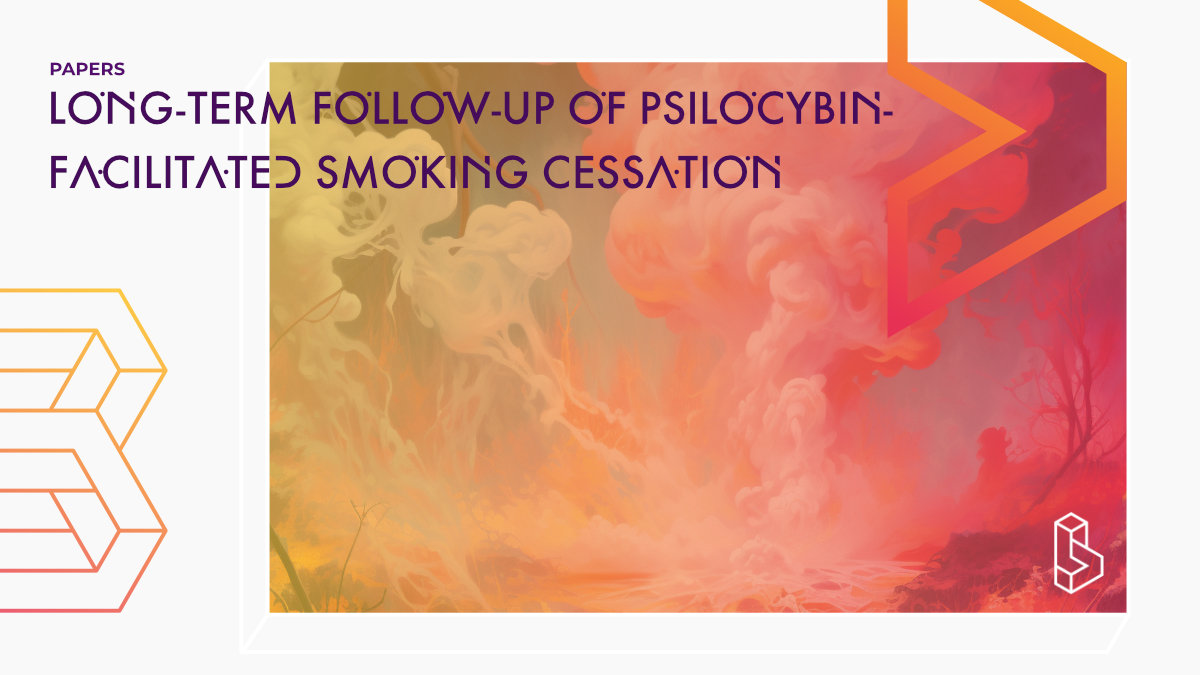This follow-up study (n=15) found that at 12 months 67% of participants didn’t return to smoking (biologically confirmed). This was 60% at an average of 30-month follow-up. This study is the first (very positive) step in seeing if psilocybin-assisted psychotherapy (PAT) may be viable for people to quit smoking.
Abstract of Long-term follow-up of psilocybin-facilitated smoking cessation
“Background: A recent open-label pilot study (N = 15) found that two to three moderate to high doses (20 and 30 mg/70 kg) of the serotonin 2A receptor agonist, psilocybin, in combination with cognitive behavioral therapy (CBT) for smoking cessation, resulted in substantially higher 6-month smoking abstinence rates than are typically observed with other medications or CBT alone.
Objectives: To assess long-term effects of a psilocybin-facilitated smoking cessation program at ≥12 months after psilocybin administration.
Methods: The present report describes biologically verified smoking abstinence outcomes of the previous pilot study at ≥12 months, and related data on subjective effects of psilocybin.
Results: All 15 participants completed a 12-month follow-up, and 12 (80%) returned for a long-term (≥16 months) follow-up, with a mean interval of 30 months (range = 16-57 months) between target-quit date (i.e., first psilocybin session) and long-term follow-up. At 12-month follow-up, 10 participants (67%) were confirmed as smoking abstinent. At long-term follow-up, nine participants (60%) were confirmed as smoking abstinent. At 12-month follow-up 13 participants (86.7%) rated their psilocybin experiences among the five most personally meaningful and spiritually significant experiences of their lives.
Conclusion: These results suggest that in the context of a structured treatment program, psilocybin holds considerable promise in promoting long-term smoking abstinence. The present study adds to recent and historical evidence suggesting high success rates when using classic psychedelics in the treatment of addiction. Further research investigating psilocybin-facilitated treatment of substance use disorders is warranted.”
Authors: Matthew W. Johnson, Albert Garcia-Romeu & Roland R. Griffiths
Notes on Long-term follow-up of psilocybin-facilitated smoking cessation
This is a follow-up to Johnson et al. (2014) which provided the first evidence (although still open-label) for smoking cessation via psychedelic-assisted therapy.
You can also find a qualitative analysis (and follow-up) in Noorani et al. (2018).
Summary of Long-term follow-up of psilocybin-facilitated smoking cessation
With almost 6 million tobacco-related deaths per year worldwide, and this number projected to rise to 8 million by 2030, innovative treatment approaches are needed.
The authors recently reported on a pilot study combining psilocybin with CBT that demonstrated safety and feasibility. Six volunteers reported acute challenging psilocybin session experiences, but these effects resolved by the end of drug session days via interpersonal support from study staff.
Find this paper
Long-term follow-up of psilocybin-facilitated smoking cessation
https://doi.org/10.3109/00952990.2016.1170135
Open Access | Google Scholar | Backup | 🕊
Cite this paper (APA)
Johnson, M. W., Garcia-Romeu, A., & Griffiths, R. R. (2017). Long-term follow-up of psilocybin-facilitated smoking cessation. The American journal of drug and alcohol abuse, 43(1), 55-60.
Study details
Compounds studied
Psilocybin
Topics studied
Addiction
Smoking
Study characteristics
Original Re-analysis
Open-Label
Follow-up
Participants
15
Humans
Authors
Authors associated with this publication with profiles on Blossom
Matthew JohnsonMatthew Johnson is an Associate Professor of Psychiatry and Behavioral Sciences at Johns Hopkins University. His research is concerned with addiction medicine, drug abuse, and drug dependence.
Albert Garcia-Romeu
Albert Garcia-Romeu is one of the principal researchers in the renaissance of psychedelics studies. He is doing his research at Johns Hopkins and focuses on psilocybin and how it can help with treating addiction.
Roland Griffiths
Roland R. Griffiths is one of the strongest voices in psychedelics research. With over 400 journal articles under his belt and as one of the first researchers in the psychedelics renaissance, he has been a vital part of the research community.
Institutes
Institutes associated with this publication
Johns Hopkins UniversityJohns Hopkins University (Medicine) is host to the Center for Psychedelic and Consciousness Research, which is one of the leading research institutes into psychedelics. The center is led by Roland Griffiths and Matthew Johnson.
Linked Research Papers
Notable research papers that build on or are influenced by this paper
Psychedelic Identity Shift: A Critical Approach to Set And SettingThis analysis of the therapeutic frameworks used in psychedelic-assisted treatment (for smoking cessation specifically) finds that suggestions from the framework map onto outcomes (and the language used by participants) from the study. This has broader implications for psychedelic-assisted therapy, as suggestions (in the therapeutic framework) can be used for various purposes (positive and negative).
Pilot study of the 5-HT2AR agonist psilocybin in the treatment of tobacco addiction
This is the first study to use psilocybin and cognitive behavioural therapy (CBT) in concert for smoking cessation in an open-label format. Participants received a moderate (20 mg/70kg) and high (30 mg/70kg) of psilocybin with a 15-week smoking cessation protocol. At the six-month follow-up, 80% of participants were smoking-free.
Psychedelic therapy for smoking cessation: Qualitative analysis of participant accounts
This long-term, qualitative follow-up study (n=12) dissects the factors that lead to long-term smoking cessation. Vivid insights, rapport with the study team, and good preparation were some factors that led to this effect.
Linked Clinical Trial
Psilocybin-facilitated Smoking Cessation Treatment: A Pilot StudyThe investigators propose to examine psilocybin administration combined with a structured smoking cessation treatment program in nicotine dependent individuals in order to provide preliminary data on the efficacy of this combined treatment for smoking cessation.

